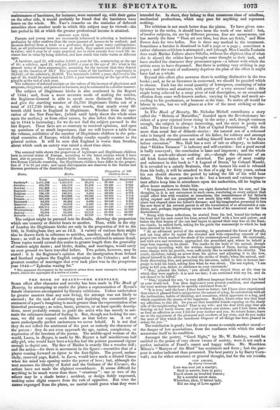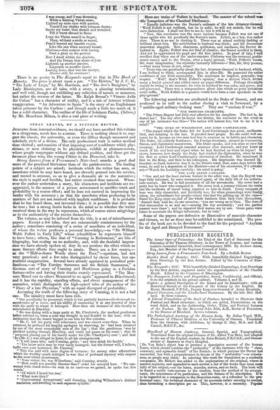THE BOOK OF BEAUTY-THE KEEPSAKE.
SOME effort after character and novelty has been made in The Book of Beauty, by attempting to render the plates a representation of Byron 's female characters accompanied by literary criticisms. Unless undertaken by greater masters than any now living, the attempt was not likely to succeed ; for the task of conceiving and depicting the counterfeit pre- sentment of a poet's imagining is much greater than the representation of an historical personage ; as coins, busts, pictures, or at least specific descrip- tions, most probably remain to guide the artist who has merely to ani- mate the substance instead of finding it. But, though not looking for suc- cess, we did not expect such failure as that before us. A set of more undesignedly perfect caricatures we never beheld. It is not that they do not reflect the sentiment of the poet or embody the character of the person : they do not even approach the age, nation, complexion, or expression of the heroines of the poems. The middle-aged woman of the world, Laura, in Beppo, is made by Mr. Hayter a half mischievous half silly girl, who would have been a hoyden had the painter possessed vigour enough to depict one. The face of Haidee is exactly like a wooden doll ; and the action-for there is movement in the figure-resembles that of a player coming forward on tiptoe to the foot-lights. The proud, melan- choly, reserved page, Kaled, in Lara, would have made a diluted Cimou when his mind was opening under the power of love; but, although the text assumes the identity of Kaled and the Gulnare of the Corsair, the artists have not made the slightest resemblance. It seems difficult for anything to be much worse than these " creations" : one or two of the ethers may be a shade better ; accident, or design feebly expressed, making some slight remove from the rule of opposites. But were the names expunged from the plates, no mortal could guess what they were
intended for. In short, they belong to that numerous class of mindless, mechanical productions, which may pass for anything and represent nothing.
The criticism is not much better than the plates. To have given con- sistency to the series, it should have been the work of one mind : but, of twelve subjects, six are by different persons, four are anonymous, one has merely the lines " Thou art not false, but thou art fickle," and Miss Power does for two ladies. Nor is there any method in the treatment. Sometimes a heroine is dismissed in half a page or a page ; sometimes a rather elaborate criticism is attempted ; and (though Miss Camilla Toulmia does exalt Marino Faliero above Othello, without the slightest idea of what she is about) the critics have brought some thought to their task, and have studied the character they pronounce upon-a labour with which the artists seem to have dispensed. But there is nothing very striking in any paper ; and the want of uniformity deprives the plan of the effect it might have had as a whole.
Beyond this effort after newness there is nothing distinctive in the two books ; and, as far as literature is concerned, we should be puzzled which to choose. Each has the usual quantity of letterpress, consisting of tales by minor writers and amateurs, with poetry of a very annual cast ; this staple being relieved by a stray piece of real description, or an occasional effusion from some well-known author, varying in length and merit ac- cording to his goodnature, or humour at the time. To notice all would be- labour in vain, but we will glance at a few of the most striking or cha- racteristic.
In The Book of Beauty, Mr. Nicholas Michell contributes a story called the " Heiress of Marseilles," founded upon the Revolutionary in- cident of a poor rejected lover rising in the army ; and, though common enough, the subject is always interesting, and the story is pretty well told. The letter Z furnishes "A Tale of Capital Punishment," with the more than usual fate of didactic stories : the natural son of a reformed rake is hanged on the prosecution of his father, for robbery and attempt at murder, the aforesaid son not making himself known till "a few days before execution." Mrs. Hall has a sort of tale or allegory, to indicate that " Hidden Treasure" is industry and self-exertion : but a good moral is badly conveyed; the conclusion is lame and impotent ; and the whole wears a much-ado-about-nothing air,-though the character of an old Irish foster-father is well sketched. The paper of most reality and substance in this book is " A Legend of Deem," by Colonel Mundy. It is revealed to a saintly Brahmin, that the instant his soul is released from his body, it will be attached to that of a pig for forty years, unless his son should shorten the period by taking the life of his wild boar father. This the son promises to do : but a lawsuit and various impor- tant affairs keep him in attendance upon the authorities, till he begins to allow lesser matters to detain him.
" It happened, however, that being one night disturbed from his rest, and his thoughts, as it is not uncommon in such cases, wandering on every subject that could affect him with vexation or uneasiness, the remembrance of his father's dying request and his unaequitted vow smote him with remorse. Nearly two years had elapsed since his father's decease; and his imagination presented to him the new form of his revered parent in all the humiliation of so abominable a con- dition, and, perhaps, imprecating curses on the head of his unnatural son for his disobedience.
" Stung with these reflections, he started from his bed, bound his turban on his head and his sash round his loins, armed himself with a bow and quiver; and before the first beams of the sun had begun to spread their rosy hue on the East- ern clouds, he sallied forth, taking for his guide the manuscript to which he had been directed by his father.
" At an advanced period of the morning, he penetrated the forest of Dowell.; and not long after he espied the elevated and wide-expanding summit of the peepnl-tree which marked the abode of his metamorphwel parent. He cautiously, and with awe and reverence, approached the prescribed spot, where he beheld a large boar reposing in its shade. The marks on the body of the animal, though not exactly according with the written description of them, having undergone some change with its growth, were sufficiently like to establish his identity. The youth, therefore, taking an arrow from his quiver and adjusting it to the bow, placed himself in the attitude to deal the stroke of death; when the animal, sad= denly discovering him, and perceiving his intention, called to him in human lan- guage to hold his hand, asking him what he was about. The son replied, ' I am going to kill you, father, in obedience to your commands.' "Boy,' grunted the father, yon should have obeyed them at the time to which they were applied: it is now too late; I am contented with my lot, and dO not choose to be killed.'
" This,' rejoined the son, is very different language from that which you held on your death-bed. You thenredeesrecated your present condition, and expressed the most anxious desire to be speedily extricated from it.' " ' It is true,' said the boar; then knew no better: but I have since experienced that when it pleased God to assign to me the nature of a hog, he endowed me with all the inclinations, habits of thinking, and sensations, which appertain to a hog, and which constitute the means of his happiness. Besides I have other ties that bind my affections to this life. Do you see that beautiful female reposing on the shady
side of the neighbouring bush? That is my wife: and the dear little pigs that are
feasting on her lovely bosom are your brothers and sisters; and I love them with as fond an affection as ever I felt for your mother and you. So return home; leave
me to the enjoyment of the pleasures and comforts of my state, and do you make the most of that which the beneficent Disposer of all things fins been pleased to ordain for yon.' "
The conclusion is good ; but the story seems to contain another moral- the danger of low associations, from the readiness with which the mind accustoms itself to its condition.
Amongst the poetry, "Good Night," by Mr. W. Badeley, would be entitled to the praise of very clever verses of society, were it not such a perfect imitation of Praed's smart and happy trifles. Mr. Monckton Milnes's " Martyrs of the Mind" has sentiment and force ; but the pur- pose is rather indicated than presented. The best poetry is by Barry Corn- wall ; not for either structure or general thought, but for the vis vividRa
CON AMORE.
By Barry Cornwall.
Love was ever yet a martyr; Bred in sorrow, born in pain; Toss'd about on troubled waters;
By a scornful arrow slain. Wherefore, then, 0 fairest lady,
Bid me sing of Love again ? I was ymng, and I-was dreaming, When-a burning Vision came, Lieited up mine eyes with passion, Touch'd my cheeks with crimson shame; Smote my heart, that shrank and trembled, Till it burst- abroad in flame Long the Vision seem'd to linger, Then, without a smile or sound,
Pass'd beyond my humble region'
Like the sun when seaward bound, Glorious,—but content with having Cast a glory on the ground.
Now I dwell within the shadows, And the Dream that shone of yore Lighteth up another passion, Lingereth on another shore; Leaving Love, that was the martyr, Master still, for evermore !
There is no poetry in The Keepsake equal to that in The Book of
,Beauty. The prose is about upon a par. "The Heiress," by J. C. D.,
"The Lady of Liege," by. Mr. Harrison, and "The Jew's Daughter," by
-Lady Blessington, are all tales, with a story, a pleasing termination,
and well told, though not exhibiting any reflection of nature or manners, but rather the reverse of the latter. Mr. Ralph Bernal's "Vicente Avila the Cuban " has a character of reality, and is a tale of interest without exaggeration. "An Adventure in Spain" is the story of an Englishman taken prisoner by the Carlists : and though made a little too much of, it has a solid character. The outline of the life of Soleiman Pasha, (Selves,) by Mr. Monckton Milnes, is also a real piece of writing.



























 Previous page
Previous page